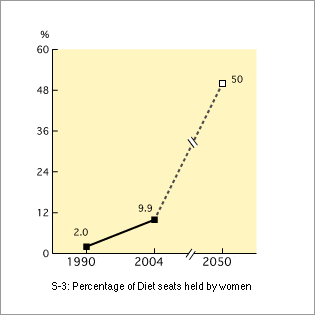ProjectsPast and current JFS projects
Indicators - Society / Gender and Minorities
S-3. Percentage of Diet Seats Held By Women
1.Current Values9.9% (in 2004)
2.Current Points
(out of a perfect score of 100 by 2050) 20 points
Calculation method:
(Current value - minimum value) / (2050 target value - minimum value) x 100
3. Explanation of Indicator
The aims of sustainable society are to build a better society through the participation of its diverse constituents, and to create happiness for the greatest number. Compared to the OECD countries, however, Japan has an extremely low number of women participating in society.
The Gender Empowerment Measure (GEM) program developed by the United Nations has produced an index using the percentage of women parliamentarians, the percentage of professional and technical careers positions held by women, the percentage of management career positions held by women, and the estimated income for men and women. Of these, JFS has chosen as an indicator the percentage of seats in the Diet that are held by women, which in Japan is strikingly low. Our thinking is that if participation in politics rises, that will influence all kinds of government policy and have a large ripple effect on society as a whole.
4.Target for 2050
50%
5.Ideal for the Future
50%
6. Rationale for Ideal and Target Values
The first of the "Eleven Important Goals" in Japan's Basic Plan for Gender Equality is "to expand the participation of women in the policy decision-making processes". We have put both our ideal and target value for 2050 at 50% (the population ratio between men and women), which more accurately reflects gender diversity.
Because it is an indicator that is the result of women's participation in society, it is not necessary that it be strictly 50%. The actual results for Sweden, whose social participation by women is advanced, are 45.3% (for 2004), making our target value quite realistic.
We think that this will have a large impact on society as a whole, including the economy, and would like to see this become a reality the sooner the better, without waiting for 2050.
7. Source
UNDP, "Human Development Report 2004"
8. Notes
As of 2004, the country with the highest percentage of women (in national diet/parliament) was Sweden with 45.3%. Japan's GEM index was 0.531, 38th place out of 177 nations.



